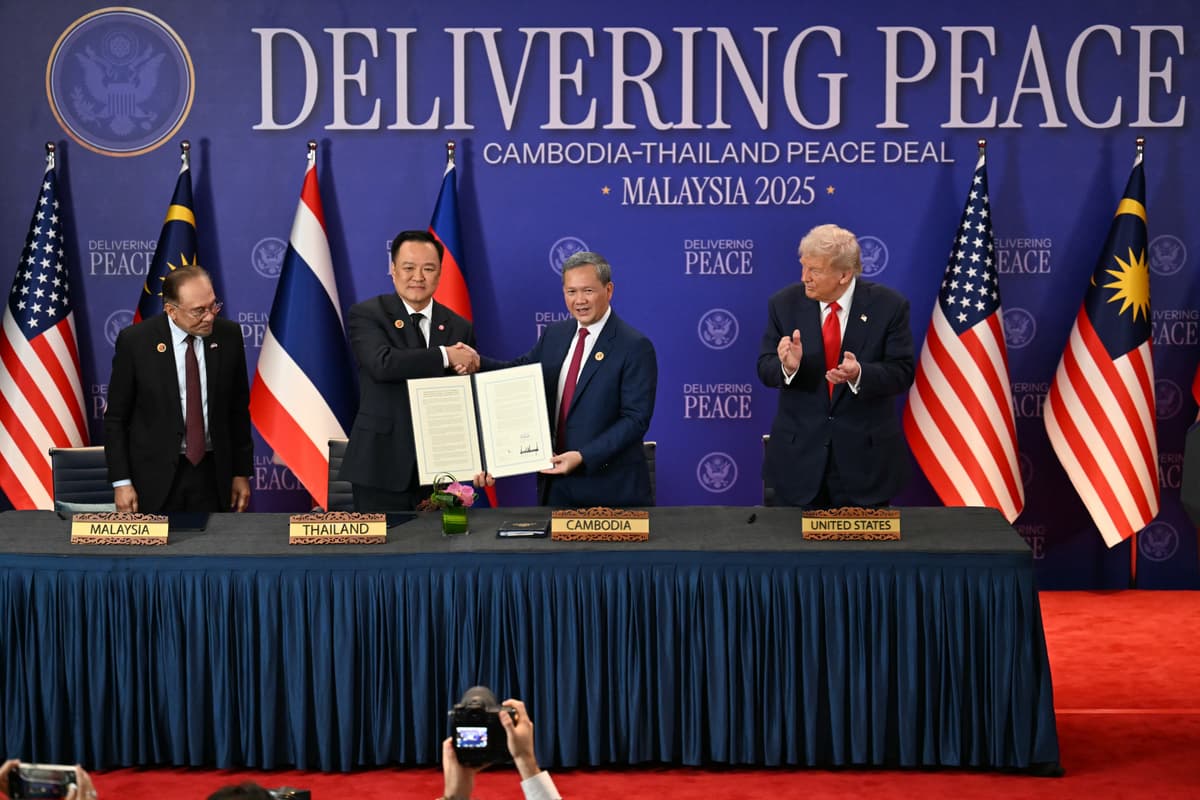‘Saved Millions of Lives’: Trump Claims Credit for Extended Ceasefire Agreement Between Thailand and Cambodia
From the Malaysian capital, Trump will move on to much more portentous meetings with the leaders of Japan, South Korea and then China later this week.

Score an opening success for President Trump at the outset of nearly a week of critical talks with northeast Asia’s top leaders.
Seated with the prime ministers of Thailand and Cambodia at the Malaysian capital of Kuala Lumpur, the president watched proudly as they signed a peace deal marking a respite if not an end to bitter battles and border skirmishes focusing on a temple just inside Cambodia’s northern border with eastern Thailand.
Mr. Trump took full credit for bringing about the agreement that cost the lives of more than 40 people in fighting along the Thai-Cambodian border in July near the Preah Vihear temple over which Thai and Cambodian forces have been quarreling for a millennium. The fighting threatened to turn into full-scale war when Thailand dispatched F16’s on bombing and strafing runs and Cambodia reciprocated with artillery barrages. Several hundred thousand people fled for safety.
“We saved maybe millions of lives,” the president claimed, implying that he had personally stopped the skirmishing from erupting into a full-scale war between the two Southeast Asian nations.
The prime ministers were richly rewarded for coming to terms. By agreeing to what Mr. Trump called“the Kuala Lumpur Peace Accords,” Cambodia’s prime minister, Hun Manet, got “a major trade deal” and Thailand’s prime minister, Anutin Charnvirakul, “a very important critical minerals agreement.”
Hosting the occasion on the sidelines of a confab of leaders of the Association of Southeast Asian Nations, Malaysia’s prime minister, Anwar Ibrahim, promised to “eliminate or reduce tariffs on nearly all U.S. exports, and allow non-discriminatory or preferential market access for U.S. agricultural and industrial goods,” the White House said.
Mr. Trump, reveling in what he viewed as a personal triumph, said he was “proud to help settle this conflict and forge a future for the region where proud, independent nations can prosper and thrive.”
Buoyed by the Thai-Cambodia agreement, Mr. Trump met leaders of a dozen other Asian countries at the ASEAN confab before moving on to what will be much more portentous meetings with the leaders of Japan, South Korea and then China on Tuesday, Wednesday and Thursday. Trade, tariffs and security will dominate the discussions.
He is expected to assure Japan’s fledgling Prime Minister Sanai Takaichi and South Korea’s President Lee Jae-myung of the durability of America’s commitment to their defense under separate alliances. Next, he sees China’s president, Xi Jinping, on Thursday the day before the gathering of the Asia-Pacific Economic Cooperation group in Gyeongju, South Korea.
Somewhere on the itinerary, Mr. Trump may also squeeze in a reunion with North Korea’s leader, Kim Jong-un, whom he has said he would like to see. So far Mr. Kim has not responded.

